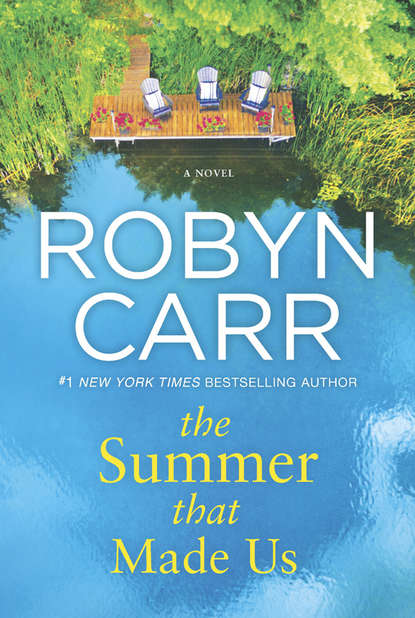По всем вопросам обращайтесь на: info@litportal.ru
(©) 2003-2025.
✖
The Summer That Made Us
Автор
Год написания книги
2018
Настройки чтения
Размер шрифта
Высота строк
Поля
The judge and Grandma Berkey stopped going to the lake house by the time there were four granddaughters, being overwhelmed by the noise and clutter of small children. And soon there were six—all little girls—and it was more than the grandparents could take, so they started renting a cabin at the lodge across the lake for their occasional weekends.
Six girls, each born one year after the other. Three for Louise, three for Jo. It seemed perfectly choreographed—Louise, the oldest sister, had Charlene and the following year Jo had Hope. Next Lou had Megan; a year later Jo gave birth to Krista. Then there was a little slip and when Krista was only a year old Jo gave birth to Beverly, who came so fast she was actually born at the lake house. Not to be outdone, Louise then had Mary Verna, who they called Bunny. And then they stopped. Six girls, sisters and cousins, in six years. Stairstep, tow-haired girls, bonded by blood and family and not just a little DNA because sisters Lou and Jo had married brothers Carl and Roy.
The Hempstead girls appeared to have charmed lives and they were happy and carefree during summer. Life back in the Twin Cities the rest of the year had its challenges, like all families. Particularly for Jo and Roy; they struggled with money and issues brought on by that struggle. But summers were different. The lake was a magic place. A haven. All of the problems they might have had through the school year drifted away. Until the summer of ’89. That summer everything changed. Charley and Megan’s little sister, Bunny, the youngest of the six girls, Louise’s baby, drowned accidentally. She was only twelve. Louise, grief-stricken and half-mad with the pain of losing a child, insisted the lake house be closed up. For good.
Charley found that at first sight the house was worn but presentable. She knew her mother paid a local family to keep an eye on the place over the years. The grass was cut and the hedges trimmed. But it was clearly in need of some attention. It was a roomy place—three bedrooms downstairs, two small rooms upstairs in the loft with dormers, two full baths and a half bath in the master. Plus, there was living space over the boathouse and the wide, deep porch was screened. The screen was torn and sagging and there wasn’t any outdoor furniture anymore.
She pried open a porch window. Meg was right; it opened easily. Upon getting inside it became obvious she hadn’t been the first one to do that. The place was heaped with trash and the beds downstairs looked used. Stained. There were, of course, no linens. But all that aside, she was wildly optimistic—the damage was all cosmetic. She would need new furniture and new appliances. The porch would have to be rescreened. Everything would need a serious scrubbing and fresh paint. There should be new toilets and maybe new tubs.
But first, she’d call an electrician to make sure the wiring was safe. And she’d have to hire someone who would clean the place out and make a trip or two to the dump.
Charley went back outside and sat on a tree stump that had been there since she was a little girl. She pulled out her phone and began making a list in the notes section. The afternoon was sunny but not warm; April in Minnesota, especially on the lake, was chilly. The lake was so calm and quiet. The gentle lapping of the waves at the shore was soothing. She closed her eyes.
Then she began to hear it—the laughter of children. Someone’s mother yelling from the porch, You better not be in the lake without an adult! She could smell hot dogs and ribs on the grill, smell the campfire, toasted marshmallows; she saw seven sunfish lying on the dock to be cleaned—the largest of the catch. Someone whistling for his dog. A happy squeal and splash. Women laughing. The horn of a speedboat and the whistles of men. The pounding of little feet across the porch, across the dock. Whispers and giggles from the screened-in porch at night; laughter from the moms inside the house. Music from the radio mingled with the laughter. Voices and shouting of a late-night party somewhere on the lake. She recalled it so vividly she could hear it—the sounds of summer.
Maybe Meg was right. Maybe summer at the lake would bring her comfort. It could heal her, Charley thought hopefully. Or give her peace in her last days?
When Meg was going into the hospital for the bone marrow transplant she had said, “This may not work, Charley. But there’s one thing I need you to know. It’s important that you know. I’m not afraid. Either way, I’m not afraid.”
That’s when Charley decided. Whatever Megan wanted, if it was within her power, she’d make sure she had it. And, Charley thought, it wouldn’t hurt me to make peace with the past.
Chapter Two (#u2940e0eb-3de3-5bdf-bcfb-b9ba8176355d)
Megan was thrilled to get a call from Charley right away. “Good news, Meg. The house needs work but it looks like it’s all cosmetic. It’s a wreck—people have definitely broken in and used the place. It’s trashed. And of course the furniture is dirty and rotting—but I can buy furniture and appliances in a flash. I’m going to get an electrician out here to check the wiring first. Also someone to haul trash. Those two things have to be done right away before I come back to the city.”
“Oh, Charley! We’ll repay you every dime!”
“That’s the least of my worries,” she said. Charley had been a minor star and had earned good money and invested wisely. She gulped back the fear that her earning days were over.
“Is it going to be a huge job?” Meg asked.
“Nope. Soap and water, paint, new furniture and appliances, new screening.”
“I wish I could help,” Megan said.
“I’m not going to do it myself,” Charley said with a laugh. “I’m going to hire people.”
“When will it be done? Will it be done soon?”
“It’ll be done by June,” she said. “It’ll probably be done before June but it’s really too cold to stay here right now. We need to wait for summer, Meg. The weather has to be warmer, especially for you. I’ll know more after I talk to a few people. I’ll be home in a few days.”
“Where are you staying?”
“There’s a motel just outside Waseka.”
“Did you look at the lodge?”
“Uh, no. For some strange reason I don’t feel like going to the lodge.”
“I promise you won’t see a familiar face, Charley!” Meg said.
“Just the same,” Charley said. “So, I don’t want you doing anything strenuous, but if you’re feeling good, you might start making a couple of lists. I haven’t looked through the cupboards yet but I’m sure most of the kitchenware is just too old and filthy to work for us. And there are no linens here. None. It looks like most of the pieces of wooden furniture are salvageable after some cleaning and polishing, but the armchairs, sofas and mattresses are out of here.”
“Okay!” Meg said. “I’ll do that! I’ll make lists!”
“Don’t get yourself too excited,” Charley cautioned. “You’re supposed to be resting and meditating and growing healthy cells.”
“I will!” she said. “I am! OMG, this is happening!”
“Oh, brother,” Charley said. “I hope this wasn’t a mistake...”
“It’s not! It’s happiness! Haven’t you heard that joy is good for illness? Joy and laughter and lake houses.”
“Take a nap,” Charley said, signing off.
Meg immediately started making lists and it filled her with optimism. That had to mean something good, she thought. She’d listed about twenty items when she stopped and instead went to the desk in the den and got out her stationery. She wanted to write to a lot of people who would probably either ignore her note or laugh and throw it away, but she was hell-bent.
Dear Hope,
In June we’re opening the lake house. Charley is doing most of the work and we’re going to spend the summer there. As you know, I’ve been somewhat under the weather.
She stopped long enough to laugh. But she thought it would be impolite to write, “As you know, I’m probably dying...”
She pressed on.
I’ve finished my chemo and bone marrow transplant and the only thing to do now is rest, relax, eat healthy food and heal. The lake is the perfect place to do that. We’d love it if you could join us. Just let me know the dates if you’re coming.
Just like old times,
Megan
She sent notes to Hope, Krista and Beverly even though Hope lived in Pennsylvania and hadn’t been back to Minnesota in at least five years and the only person Hope really kept in touch with was Grandma Berkey and occasionally Charley. Hope was a snob and loved having a famous cousin. Krista, unfortunately, was in a women’s prison, and the last time Megan heard from her, there was no parole in sight. And Beverly left the family for foster care the year after Bunny drowned. She went to live with a family better equipped to take care of her in the years following her trauma. Bunny had been Beverly’s best friend and they’d been together in that little rowboat when the storm rose up suddenly and Bunny was lost. Her foster family became her family of choice, though she did stay in touch with her mother, Jo. And Megan got Christmas cards with little notes. But the idea of Beverly going to the lake? After what had happened there? It was at best a very slim possibility.
Since it wasn’t likely any of them would come, Megan decided to reach out to Aunt Jo and Grandma Berkey. Aunt Jo would never go to the lake without an invitation from Louise and no one knew why or how Louise had that kind of power over her sister. They hadn’t been close since Bunny died. And Grandma Berkey was in a nursing home—someone would have to fetch her. With a little guilt and a sigh of resignation Megan thought that Charley would do that if she wanted it badly enough. Or John would. At the moment Meg had some very persuasive powers.
The only one she didn’t send a note to was her mother. She hadn’t even told Louise what they were doing. She’d deal with that later. But she did put stamps on her notes and took them out to the mailbox for the postman to pick up.
She told John what she’d done. “But I don’t think I’ll tell Charley,” she said.
“I can take a leave this summer,” John said. “I want us to be together.”
“Come on the weekends,” she said. “Let me stay with Charley during the week. Go to work. Your patients need you, you need them and you need to live a normal life.” Then she rubbed her cheek against his. “I might not be around forever, my darling. And I want you to carry on. In fact, the only thing I will ever ask of you is that you carry on.”
She put on some classical, cell-fortifying symphony music, reclined on the sofa in the den, took deep meditative breaths and pictured Lake Waseka as she remembered it, when it was at its best. She began to see them all as children, before the last year, six little blondes with bodies like brown sugar, freckled from the sun. Dirty, with calluses on their bare feet from not wearing shoes all summer, flushed and happy, gamy and healthy and strong. Giggling late into the muggy summer nights. Summer after summer. Everything that had nagged or bothered all year long disappeared as it was left behind. It was an escape from the real world. Grandma and the judge covered the expenses, from gas to groceries, so the material burdens were fewer and Lou and Jo were almost equals. This was significant because Aunt Jo worried about money all the time and it made her fretful. At the lake she was carefree. Happy. And there was almost nothing prettier than Aunt Jo when she was happy.
Their mothers became best friends again; there was laughter and what Grandma used to call shenanigans. They were fun. Young men passing in speedboats noticed them. Both Lou and Jo were attractive women. Lou was statuesque and bold and brazen while Jo was small and lovely and buxom and fragile. They were opposites who complemented each other. Lou often groused that Jo was the pretty one but it wasn’t exactly true. Lou could be pretty, too, when she was in a good mood, laughed and smiled. It was only the frown of envy and anger that made her plain.
At night they’d play cards or Scrabble and sometimes turn the radio up and dance—line dances and disco and boogie-woogie. All the little girls would dance, too. It was like having a party with your best friends every day of the summer. Then Lou and Jo would sleep together in Grandma’s big bed just like having a pajama party and whisper and laugh late into the night. There were eight bodies and five beds; when their husbands showed up on weekends they’d pile the kids on top of each other or make them take to the screened-in porch, but that big king-size bed of Grandma’s served them very well when it was just the two of them and the six kids.













